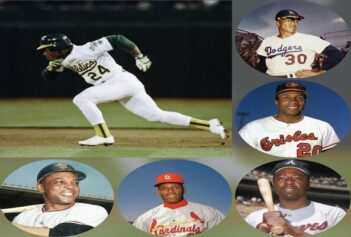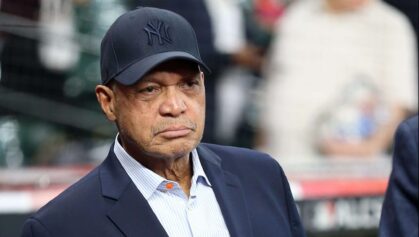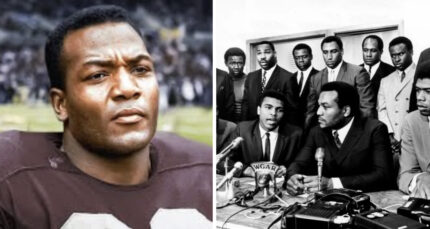While NBA owners continue to fight for the right to disparage and stereotype people, MLB, despite dips in black-player participation, continues its commendable and calculated crusade to not only preserve the African-American’s irreplaceable position in baseball history, but also show the proper respect to the pioneers of the game by recognizing their accomplishments and importance to America beyond athletics.
The 2014 Civil Rights Game will be played at Minute Maid Park on Friday, May 30th. The game between the Astros and the Orioles will air nationally on the MLB Network, with Harold Reynolds, Matt Vasgersian and Sam Ryan heating the microphones. The first 15,000 fans to enter Minute Maid Park will receive a special commemorative Civil Rights Game cap, and the Astros will treat fans to a wild postgame fireworks show with a kickin’ Motown theme.
This year’s game marks the eighth year of the event that was originally created by Major League Baseball to pay tribute to those who fought for equal rights in this country. Houston joins Memphis, Cincinnati, Atlanta and Chicago as cities to host the Civil Rights Game. The struggling ‘Stros take the field to face the AL East-contending O’s wearing the Negro Leagues throwback uniforms of the Houston Eagles — the only Negro Leagues team from Texas. B-More will be rocking the uniforms of the Baltimore Elite Giants (1938-49).
It’s like hopping in a baseball time machine and witnessing life on the other side of MLB’s segregated tracks, before Jackie Robinson did his Brooklyn bop back in ‘47. The Civil Rights Game highlights the positives that emerged from a very dark time in baseball and the Negro League heroes who endured because of their love and respect for the game. Now, the spirit and memories of these very players, who were kept out of baseball like unworthy animals, are the featured and honored attractions.
The Civil Rights Game began in Memphis, Tenn., in 2007, centering on an exhibition game between the Cardinals and Indians. After another exhibition game in Memphis in '08, the Civil Rights Game moved to Cincinnati ('09-10), then Atlanta ('11-12) as official games, and last year was hosted in Chicago by the White Sox.
This week, power players from around MLB, celebrities, music industry big wigs and those who have championed civil rights, all infiltrated The Bayou for a series of events leading up to tonight’s game, which was implemented by Major League Baseball to pay proper tribute to those who made huge personal sacrifices and dedicated their lives to attaining equal rights for all Americans.
"We made it clear when we got involved a couple of years ago when we bought the team that we were very interested in diversity, and we'd be a big supporter of it," Astros owner Jim Crane said. Most Astros fans would prefer, Crane dedicate the majority of his energies to a dynasty rather than diversity, but in these supposed “post-racial” times, it seems you can’t have one without the other.
The celebration kicked off on Thursday at Union Station at Minute Maid Park with an esteemed panel of educators, entrepreneurs and baseball minds discussing the pivotal role baseball played in the civil rights movement, the game's continued presence as a social institution and its impact on present-day social issues affecting the country.
This comes on the heels of President Obama becoming the first sitting president to visit The Baseball Hall of Fame and Museum in Cooperstown, NY earlier this month. During his visit, Bam noted that tourism generates $1.5 trillion in economic activity and supports nearly 8 million jobs, and baseball’s international lure and historical significance will continue to be a driving force in this country’s return to economic stability.
"Standing here and looking at over 150 years of our country's history, baseball describes our history in so many ways," he said . "We're reminded of all the obstacles we've overcome to get here. This Hall has memories of two World Wars that we fought and won."
"It has memories of color barriers being broken, Jackie Robinson's uniform and the record of his first season as a Dodger . It shows us the history of communities that we built across the new continent and ways we connected with our country and our world. And how women athletes started getting the recognition that they deserved."
The Baseball & Civil Rights Movement Roundtable Discussion elaborated on Obama’s position. The one consensus among all panelists was that a “good attitude” is mandatory for inclusion in the MLB mix . It was moderated by Harvard Law School professor Dr. Charles Ogletree and will be streamed on MLB.com and Astros.com prior to the Civil Rights Game.
The participants included Ernest Green, a member of the "Little Rock Nine"; Linda Alvarado, member of the Rockies' ownership group and CEO of Alvarado Construction; Bob Watson, MLB’s first African-American GM, Bob Kendrick, president of the Negro Leagues Baseball Museum ; former Astros pitcher J.R. Richard and MLB Network analyst and two-time All-Star Harold Reynolds.
"The Roundtable has been very, very successful, because you have different types of personalities there to answer questions that normally wouldn't be answered," said legendary Hall of Famer Frank Robinson, Major League Baseball's executive vice president of baseball development.
Watson, in particular, is most known for being the first black GM in baseball to orchestrate a World Series title. Not just any team, but the 1996 Yankees team that kicked off another MLB Dynasty and won the franchise’s first WS c'hip since 1978. He’s a pioneer in the game with strong Houston ties. He was a two-time All-star with the Astros from 1966-79 and then in 1993 he became MLB General Manager when he was hired to run the franchise. Watson retired in 2010 after serving as MLB's VP of Rules and On-Field Operations.
Legendary players Hank Aaron and Robinson also addressed the audience, which included a large contingent of junior high school kids – a critical age in youth development – and shared invaluable jewels about their lives, baseball and how it helped them avoid the oppressive pitfalls of racism.
“When I went to Colombia SC in the minor leagues they told me I had to stay at the hotel,” Robinson said via mlb.com video, recalling MLB life in the ‘50s and ‘60s. “I had to stay in a private home. The only time you saw your teammates were at the ball field or on a road trip. I can’t even repeat the things they said to me in those cities, but it motivated me to get out of there and up to the bigs quicker…I said to myself nobody is going to deprive me of my goal of getting to the big leagues. Today is a little different but you still have to be determined and willing to work for what you want. There are a lot of opportunities out there for young people. Take advantage of your opportunities.”
Said baseball’s “clean” home run king Aaron:
“The most important thing all of these kids need to understand is that regardless of how many homers or base hits you get the most important thing is that there are other things in life that you can do. If you don't play baseball you can be a banker associated with baseball. The most important thing is to make sure you get the most out of your ability and you do that by continuing your education and don’t let anyone tell you, you can’t do it.”
MLB and the Astros will also pay special tribute to the 50th anniversary of the Civil Rights Act of 1964 and the 60th anniversary of Brown v. Board of Education at Friday's MLB Beacon Awards Luncheon.
Cancer survivor Robin Roberts, co-anchor of ABC’s “Good Morning America,” will be the keynote speaker at the luncheon. Baseball Commissioner Bud Selig will speak at the event, which will honor the late best-selling author and poet Dr. Maya Angelou, founder of Motown Records and Rock & Roll Hall of Famer Berry Gordy and Pro Football Hall of Famer and social activist Jim Brown. The award recognizes individuals whose lives and actions reflect the spirit and principles of the civil rights movement.
Angelou died on Wednesday at her home in Winston-Salem, N.C. Before her death, the 86-year-old poet, icon and promoter of black consciousness, released a statement in anticipation of the event:
"I am aware that the Civil Rights Game is Major League Baseball's opportunity to encourage and lead its fans and friends in honoring and remembering a critical time in our nation's history, and I respect the league greatly for recognizing the need for this event," Angelou said last week in a statement. "I am very proud to be one of the MLB Beacon Award honorees, amongst an impressive list of figures that were, and still are, part of the civil rights movement."
Providing the entertainment for the event is singer/songwriter Aloe Blacc, who will perform his banger "Eyes of a Child" earlier in the day at the luncheon. Blacc will also perform his hit songs "Wake Me Up" and "The Man" on the field prior to the Civil Rights Game, with the "The Man" airing live on MLB Network.
Additionally, Grammy Award-winning violinist and UN Goodwill Ambassador Miri Ben-Ari will perform her song “Symphony of Brotherhood,” featuring Rev. Dr. Martin Luther King, Jr. and the iconic “I Have A Dream” speech.
Robin Roberts, co-anchor of ABC's "Good Morning America,” is the keynote speaker. The national anthem will be sang by Jadagrace prior to the game, and Grammy nominee Jeffrey Osborne will sing "America the Beautiful" during the seventh-inning stretch.
MLB Chopping and Screwing
Houston is a perfect backdrop for the festivities, pride and excitement created by The Civil Rights Game. As mentioned previously, Watson’s rise occurred in Houston, and in skipper Bo Porter, they have one of just three African-American managers in the sport along with the Rangers’ Ron Washington and Seattle Mariners skipper Lloyd McClendon. The general manager ranks are even more destitute. In the history of the game, there have been but four African-American general managers — Bill Lucas (Atlanta), Watson (Houston, New York Yankees), Tony Reagins (Los Angeles Angels) and Kenny Williams (Chicago), who was a panelist at last year’s Civil Right’s Game pre-activities.
The city also has a growing network of African-American players who have defied immeasurable odds and made it to The Show. Dodgers superstar Carl Crawford is the highest-paid member of a fraternity of talented African-American baseball players the Houston area has produced in the last 15 years—a list that includes Michael Bourn of the Indians, James Loney of the Rays and Chris Young of the Mets.
Crawford is a 13-year, MLB vet and was one of the most heavily recruited high school quarterbacks in the country in 1998. He wisely chose baseball over college football powerhouse Nebraska. Crawford was taken in the second round of the 1999 First-Year Player Draft by Tampa Bay and blossomed into a five-time All-Star and Gold Glove, leather-flasher.
Loney, 30, grew up in the suburbs, but he and Crawford are both products of MLB's Reviving Baseball in Inner Cities (RBI) youth-outreach program. Loney played at Elkins High School in the Houston suburb of Missouri City for head coach Rick Carpenter — father of Cardinals infielder Matt Carpenter.
Cleveland Indians All-Star outfielder Bourn was a standout high school point guard from Houston, who concentrated on baseball during his sophomore year and became one of the game’s elite base stealers. The Astros took Bourn in the 19th round of the 2000 Draft, but he wound up playing three years for the University of Houston before the Phillies selected him in the fourth round in 2003. He later won two Gold Gloves with the Astros.
Young, 30, grew up in a baseball haven — Southwest Houston. But when it was time to go to high school, he attended baseball powerhouse Bellaire which had produced Major Leaguers Chuck Knoblauch, Jose Cruz Jr., Kelly Wunsch and Bubba Crosby, among others. Young was drafted in the 16th round by the White Sox in 2001, was a 2010 National League All-Star with Arizona and is in his first year with the Mets.
Give Bud Selig his credit. In his final chapter as MLB czar he has forced the issue on diversity in baseball and preserved the irrefutable and lofty position black pioneers hold in the sport. Under his watch, baseball's had Black, Asian and Women as front office top dawgs and Jackie Robinson’s legacy remains unblemished and held in the highest esteem.
And with The Civil Rights Game, Selig masterfully packages baseball’s truthful history into a celebratory, and sellable, game, while briding fan interest in baseball’s present pleasures with the many, magical moments of its glorified past.



